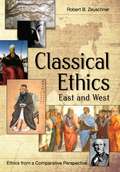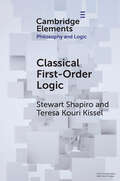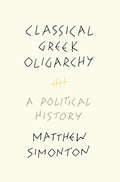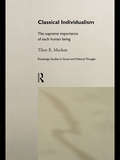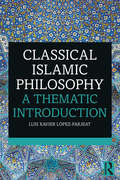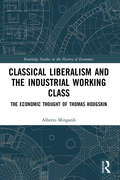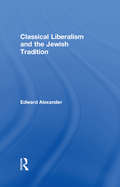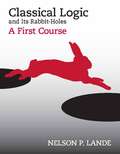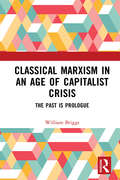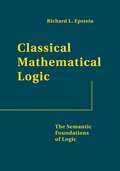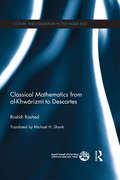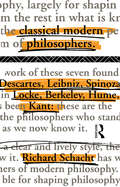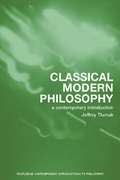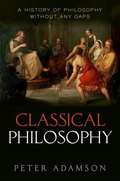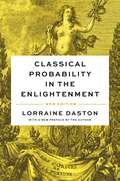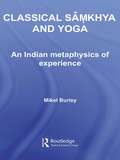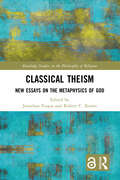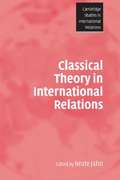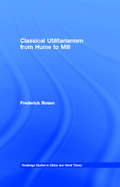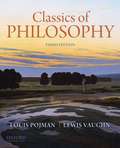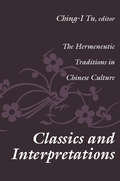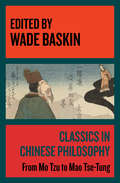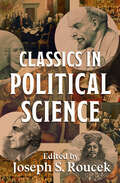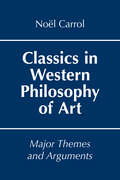- Table View
- List View
Classical Ethics: Ethics From A Comparative Perspective: East And West
by Marshall Glickman Adrienne Nunez Robert ZeuschnerClassical Ethics is a thorough and well-balanced compendium of Western and non-Western ethical systems in a multicultural historical framework. Zeuschner focuses on the key concepts and presumptions of 13 major philosophers from around the world. He utilizes a systematic approach in his writing that describes the basic components of each system and discusses how each has maintained its appeal for so many centuries. In this text, Western tradition is represented by major classical figures: Socrates and Plato, Aristotle, Epicurus, St. Augustine, Aquinas, Butler, Hume, Kant, and Mill. Eastern ethical tradition is represented by Indian Buddhist ethics, Chinese Confucian ethics, and Chinese Taoist ethics of Lao-tzu and Chuang-tzu. This work broadens a student's perspective and enriches one's understanding of ethical principles as they occur and have developed historically in different cultural contexts.
Classical First-Order Logic (Elements in Philosophy and Logic)
by Stewart Shapiro Teresa Kouri KisselOne is often said to be reasoning well when they are reasoning logically. Many attempts to say what logical reasoning is have been proposed, but one commonly proposed system is first-order classical logic. This Element will examine the basics of first-order classical logic and discuss some surrounding philosophical issues. The first half of the Element develops a language for the system, as well as a proof theory and model theory. The authors provide theorems about the system they developed, such as unique readability and the Lindenbaum lemma. They also discuss the meta-theory for the system, and provide several results there, including proving soundness and completeness theorems. The second half of the Element compares first-order classical logic to other systems: classical higher order logic, intuitionistic logic, and several paraconsistent logics which reject the law of ex falso quodlibet.
Classical Greek Oligarchy: A Political History
by Matthew SimontonClassical Greek Oligarchy thoroughly reassesses an important but neglected form of ancient Greek government, the "rule of the few." Matthew Simonton challenges scholarly orthodoxy by showing that oligarchy was not the default mode of politics from time immemorial, but instead emerged alongside, and in reaction to, democracy. He establishes for the first time how oligarchies maintained power in the face of potential citizen resistance. The book argues that oligarchs designed distinctive political institutions—such as intra-oligarchic power sharing, targeted repression, and rewards for informants—to prevent collective action among the majority population while sustaining cooperation within their own ranks.To clarify the workings of oligarchic institutions, Simonton draws on recent social science research on authoritarianism. Like modern authoritarian regimes, ancient Greek oligarchies had to balance coercion with co-optation in order to keep their subjects disorganized and powerless. The book investigates topics such as control of public space, the manipulation of information, and the establishment of patron-client relations, frequently citing parallels with contemporary nondemocratic regimes. Simonton also traces changes over time in antiquity, revealing the processes through which oligarchy lost the ideological battle with democracy for legitimacy.Classical Greek Oligarchy represents a major new development in the study of ancient politics. It fills a longstanding gap in our knowledge of nondemocratic government while greatly improving our understanding of forms of power that continue to affect us today.
Classical Groups, Derangements and Primes
by Timothy C. Burness Michael GiudiciA classical theorem of Jordan states that every finite transitive permutation group contains a derangement. This existence result has interesting and unexpected applications in many areas of mathematics, including graph theory, number theory and topology. Various generalisations have been studied in more recent years, with a particular focus on the existence of derangements with special properties. Written for academic researchers and postgraduate students working in related areas of algebra, this introduction to the finite classical groups features a comprehensive account of the conjugacy and geometry of elements of prime order. The development is tailored towards the study of derangements in finite primitive classical groups; the basic problem is to determine when such a group G contains a derangement of prime order r, for each prime divisor r of the degree of G. This involves a detailed analysis of the conjugacy classes and subgroup structure of the finite classical groups.
Classical Individualism: The Supreme Importance of Each Human Being (Routledge Studies in Social and Political Thought)
by Tibor R. MachanIn Classical Individualism, Tibor R. Machan argues that individualism is far from being dead. Machan identifies, develops and defends what he calls classical individualism - an individualism humanised by classical philosophy, rooted in Aristotle rather than Hobbes. This book does not reject the social nature of human beings, but finds that every one has a self-directed agent who is responsible for what he or she does. Machan rejects all types of collectivism, including communitarianism, ethnic solidarity, racial unity, and gender identity. The ideas expressed here have important social and political implications, and will be of interest to anyone concerned with the notion of individuality and individual responsibility.
Classical Islamic Philosophy: A Thematic Introduction
by Luis Xavier López-FarjeatThis thematic introduction to classical Islamic philosophy focuses on the most prevalent philosophical debates of the medieval Islamic world and their importance within the history of philosophy. Approaching the topics in a comprehensive and accessible way in this new volume, Luis Xavier Lopez-Farjeat, one of the co-editors of The Routledge Companion to Islamic Philosophy, makes classical Islamic philosophy approachable for both the new and returning student of the history of philosophy, medieval philosophy, the history of ideas, classical Islamic intellectual history, and the history of religion. Providing readers with a complete view of the most hotly contested debates in the Islamic philosophical tradition, Lopez-Farjeat discusses the development of theology (kalām) and philosophy ( falsafa) during the ʿAbbāsid period, including the translation of Aristotle into Arabic, the philosophy and theology of Islamic revelation, logic and philosophy of language, philosophy of natural science, metaphysics, psychology and cognition, and ethics and political philosophy. This volume serves as an indispensable tool for teachers, students, and independent learners aiming to discover the philosophical problems and ideas that defined the classical Islamic world. Key Features • Offers readers a broad, thorough view of the history of Islamic philosophy by using a thematic approach. • Traces the dialogues between philosophers and theologians about important and controversial topics. • Offers both historical descriptions of the key debates in classical Islamic philosophy and current interpretations by contemporary scholars. • Includes extensive lists for further reading at the end of each chapter, directing curious students to the best avenues for further research.
Classical Liberalism and the Industrial Working Class: The Economic Thought of Thomas Hodgskin (Routledge Studies in the History of Economics)
by Alberto MingardiThomas Hodgskin (1787–1869) is today a largely unknown figure, sometimes considered to be a forerunner of Karl Marx. Yet a closer look at Hodgskin’s works reveals that he was actually a committed advocate of laissez-faire economics and enthusiastic about labor-saving machinery and the Industrial Revolution, with a genuine interest in the well-being of the working classes. This book places him in the tradition of classical liberalism, where he belongs—as a disciple of Adam Smith, but even less tolerant of government power than Smith was. Classical Liberalism and the Industrial Working Class: The Economic Thought of Thomas Hodgskin will be of interest to advanced students and scholars in the history of economic thought, economic history and the history of political thought.
Classical Liberalism and the Jewish Tradition
by Edward AlexanderThe incongruence if not antagonism between modern liberalism and the Jewish sense of the world has been most notably articulated by Lionel Trilling. Certainly the imaginative limitations and intellectual smugness he discerned in his own ideological party found a parallel, in his view, in the embrace of liberalism by the American Jewish community. The consequences of that embrace entail both a superficial intellectual and religious culture and a misunderstanding of the social and political dimensions of Judaism. In Classical Liberalism and the Jewish Tradition, Edward Alexander engages in a wide-ranging exploration of the roots of the fundamental antagonism between liberalism and Jewish tradition from the nineteenth century to the present day.Central to Alexander's arguments is his incisive critique of the distortion of modern Judaism as a child of the Enlightenment and the notion that specifically Jewish concerns, whether with Zionism, the Holocaust, or sacred and secular writings, constitute a narrow and parochial betrayal of liberal interests. The chapters are divided among political, religious, and literary subjects. The opening chapter on Mill's ambivalent attitude toward the Jews establishes terms of conflict between Judaism and liberal secularism and universality as do chapters on the antisemitism of Thomas Arnold and Marx and the more ambiguous Jewish self-identification of Disraeli.Alexander examines such disparate topics as the hostility to the idea of a Jewish state on the part of numerous Israeli intellectuals, the disdain among liberals toward the specifically Jewish dimension of the Holocaust, and the capitulation of the Modern Language Association to the anti-Zionism of Edward Said. Turning to the uneasy status of Jewish religious texts and secular literature as sources of cultural revitalization, Alexander deals with the attempt by the Israeli scholar Adin Steinsaltz to bring the Talmud to the attention of contemporary Jewish readers and includes a chapter on his nineteenth-century precursor Emanuel Deutsch and his relationship to George Eliot. An analysis of Ruth Wisse's efforts to establish a modern Jewish literary canon is rounded out by chapters on two of the major figures of that canon: Isaac Bashevis Singer and Philip Roth.While diverse in subject matter, Classical Liberalism and the Jewish Tradition is consistent in its unapologetic advocacy of a Jewish point of view and in its depth of scholarship in tracing the historical roots of contemporary attitudes and ideologies.
Classical Logic And Its Rabbit-holes: A First Course
by Nelson P. LandeMany students ask, 'What is the point of learning formal logic?' This book gives them the answer. Using the methods of deductive logic, Nelson Lande introduces each new element in exquisite detail, as he takes students through example after example, proof after proof, explaining the thinking behind each concept. Shaded areas and appendices throughout the book provide explanations and justifications that go beyond the main text, challenging those students who wish to delve deeper, and giving instructors the option of confining their course to the basics, or expanding it, when they wish, to more rigorous levels. Lande encourages students to think for themselves, while at the same time providing them with the level of explanation they need to succeed. It is a rigorous approach presented in a style that is informal, engaging, and accessible. Students will come away with a solid understanding of formal logic and why it is not only important, but also interesting and sometimes even fun. It is a text that brings the human element back into the teaching of logic
Classical Marxism in an Age of Capitalist Crisis: The Past is Prologue
by William BriggsWill capitalism survive forever? Capitalism has always lived in and with crisis. Wars, revolutions, economic depression and repeated recessions, the threat of nuclear annihilation and ecological disaster have all failed to break the dominance of this economic and political system. Challenging the predominance of capitalism in a world fraught with inequalities, this book returns to classical Marxism to reaffirm its relevance. It explores the contradictions within capitalism as well as explaining why Marxism has been unable to mount a sustained challenge to capitalism. In order to explore concrete alternatives in a period of increasing capitalist globalisation and crisis, it goes on to present perspectives by which theory and practice might be reunited to building independent political and organisational structures. A search for “something better”, this volume will be an engaging read for scholars and researchers of politics, especially political theory and political economy, economics, and sociology.
Classical Mathematical Logic: The Semantic Foundations of Logic
by Richard L. EpsteinIn Classical Mathematical Logic, Richard L. Epstein relates the systems of mathematical logic to their original motivations to formalize reasoning in mathematics. The book also shows how mathematical logic can be used to formalize particular systems of mathematics. It sets out the formalization not only of arithmetic, but also of group theory, field theory, and linear orderings. These lead to the formalization of the real numbers and Euclidean plane geometry. The scope and limitations of modern logic are made clear in these formalizations. The book provides detailed explanations of all proofs and the insights behind the proofs, as well as detailed and nontrivial examples and problems. The book has more than 550 exercises. It can be used in advanced undergraduate or graduate courses and for self-study and reference. Classical Mathematical Logic presents a unified treatment of material that until now has been available only by consulting many different books and research articles, written with various notation systems and axiomatizations.
Classical Mathematics from Al-Khwarizmi to Descartes (Culture and Civilization in the Middle East)
by Roshdi RashedThis book follows the development of classical mathematics and the relation between work done in the Arab and Islamic worlds and that undertaken by the likes of Descartes and Fermat. ‘Early modern,’ mathematics is a term widely used to refer to the mathematics which developed in the West during the sixteenth and seventeenth century. For many historians and philosophers this is the watershed which marks a radical departure from ‘classical mathematics,’ to more modern mathematics; heralding the arrival of algebra, geometrical algebra, and the mathematics of the continuous. In this book, Roshdi Rashed demonstrates that ‘early modern,’ mathematics is actually far more composite than previously assumed, with each branch having different traceable origins which span the millennium. Going back to the beginning of these parts, the aim of this book is to identify the concepts and practices of key figures in their development, thereby presenting a fuller reality of these mathematics. This book will be of interest to students and scholars specialising in Islamic science and mathematics, as well as to those with an interest in the more general history of science and mathematics and the transmission of ideas and culture.
Classical Modern Philosophers: Descartes to Kant
by Richard SchachtDescartes, Leibniz, Spinoza, Locke, Berkeley, Hume, and Kant: these are the seven philosophers who stand out from the rest in what is known as the `modern' period in philosophy. Their thought defines the mainstream of classical or early modern philosophy, largely responsible for shaping philosophy as we now know it.In a clear and lively style, Richard Schacht has written a thorough introduction to the work of these seven founding fathers of modern philosophy. The bibliography has been updated for this revised edition to take account of the recent explosion of writings on modern philosophy.
Classical Modern Philosophy: A Contemporary Introduction (Routledge Contemporary Introductions to Philosophy)
by Jeffrey TlumakClassical Modern Philosophy introduces students to the key philosophers of the seventeenth and eighteenth centuries, and explores their most important works. Jeffrey Tlumak takes the reader on a chronological journey from Descartes to Kant, tracing the themes that run through the period and their interrelations. The main texts covered are: Descartes' Meditations on First Philosophy Spinoza's Ethics Locke's Essay Concerning Human Understanding Leibniz's Discourse on Metaphysics and Monadology Berkeley's A Treatise Concerning the Principles of Human Knowledge and Three Dialogues between Hylas and Philonous Hume's An Enquiry Concerning Human Understanding and Dialogues Concerning Natural Religion Kant's Critique of Pure Reason Classical Modern Philosophy is the ideal textbook to accompany a course in the history of modern philosophy, but each chapter can also be studied alone as an introduction to the featured philosopher or work. Jeffrey Tlumak outlines and assesses prominent interpretations of the texts, and surveys the legacy of each great thinker.
Classical Philosophy: A History of Philosophy Without Any Gaps (A History of Philosophy #Volume 1)
by Peter AdamsonEarly Greek Philosophy Socrates and Plato Aristotle
Classical Probability in the Enlightenment, New Edition
by Lorraine DastonAn award-winning history of the Enlightenment quest to devise a mathematical model of rationalityWhat did it mean to be reasonable in the Age of Reason? Enlightenment mathematicians such as Blaise Pascal, Jakob Bernoulli, and Pierre Simon Laplace sought to answer this question, laboring over a theory of rational decision, action, and belief under conditions of uncertainty. Lorraine Daston brings to life their debates and philosophical arguments, charting the development and application of probability theory by some of the greatest thinkers of the age. Now with an incisive new preface, Classical Probability in the Enlightenment traces the emergence of new kind of mathematics designed to turn good sense into a reasonable calculus.
Classical Samkhya and Yoga: An Indian Metaphysics of Experience (Routledge Hindu Studies Series)
by Mikel BurleySamkhya and Yoga are two of the oldest and most influential systems of classical Indian philosophy. This book provides a thorough analysis of the systems in order to fully understand Indian philosophy. Placing particular emphasis on the metaphysical schema which underlies both concepts, the author adeptly develops a new interpretation of the standard views on Samkhya and Yoga. Drawing upon existing sources and using insights from both Eastern and Western philosophy and religious practice, this comprehensive interpretation is respectful to the underlying spiritual purpose of the Indian systems. It serves to illuminate the relation between the theoretical and practical dimensions of Samkhya and Yoga. The book fills a gap in current scholarship and will be of interest to those concerned with Indology as well as philosophies in general and their similarities and differences with other traditions.
Classical Theism: New Essays on the Metaphysics of God (Routledge Studies in the Philosophy of Religion)
by Robert C. Koons Jonathan FuquaThis volume provides a contemporary account of classical theism. It features 17 original essays from leading scholars that advance the discussion of classical theism in new and interesting directions. It’s safe to say that classical theism—the view that God is simple, omniscient, and the greatest possible being—is no longer the assumed view in analytic philosophy of religion. It is often dismissed as being rooted in outdated metaphysical systems of the sort advanced by ancient and medieval philosophers. The main purpose of this volume is twofold: to provide a contemporary account of what classical theism is and to advance the scholarly discussion about classical theism. In Section I, the contributors offer a clear and cutting-edge account of the nature and existence of the God and the historical and theological foundations of classical theism. Section II contains chapters on a variety of topics, such as whether classical theism’s doctrine of simplicity needs revision, whether simplicity is compatible with the Christian doctrine of the Incarnation, and whether the hypothesis of a multiplicity of divine ideas is consistent with divine simplicity, among others. Classical Theism will appeal to scholars and advanced students in the philosophy of religion who are interested in the nature of God.
Classical Theory In International Relations
by Beate JahnClassical political theorists such as Thucydides, Kant, Rousseau, Smith, Hegel, Grotius, Mill, Locke and Clausewitz are often employed to explain and justify contemporary international politics and are seen to constitute the different schools of thought in the discipline. However, traditional interpretations frequently ignore the intellectual and historical context in which these thinkers were writing as well as the lineages through which they came to be appropriated in International Relations. This collection of essays provides alternative interpretations sensitive to these political and intellectual contexts and to the trajectory of their appropriation. The political, sociological, anthropological, legal, economic, philosophical and normative dimensions are shown to be constitutive, not just of classical theories, but of international thought and practice in the contemporary world. Moreover, they challenge traditional accounts of timeless debates and schools of thought and provide new conceptions of core issues such as sovereignty, morality, law, property, imperialism and agency.
Classical Utilitarianism from Hume to Mill (Routledge Studies in Ethics and Moral Theory #Vol. 2)
by Frederick RosenThis book presents a new interpretation of the principle of utility in moral and political theory based on the writings of the classical utilitarians from Hume to J.S. Mill. Discussion of utility in writers such as Adam Smith, William Paley and Jeremy Bentham is included.
Classics Of Philosophy
by Lewis Vaughn Louis PojmanClassics of Philosophy is the most comprehensive anthology of writings in Western philosophy in print. Spanning 2500 years of thought, it is ideal for introduction to philosophy and history of philosophy courses that are structured chronologically. With more than seventy works by fortyphilosophers as well as fragments from the Pre-Socratics, it offers students and instructors an extensive and economical collection of the major works of the Western tradition.The new third edition, like its predecessor, provides students with unabridged or substantial texts of classic works while keeping as close to the heart of the canon as possible in the space provided. This revision expands many of the existing readings, adds some important philosophers, and includesjust enough pedagogy to help students without diminishing their own direct experience with the text. Specifically, improvements include:DT Expanding Aristotle's Posterior Analytics, On the Soul, Metaphysics, and Nicomachean Ethics; Berkeley's On the Principles of Human Knowledge; and Hume's Treatise on Human NatureDT Adding selections from Maimonides and Schopenhauer as well as Kant's Critique of Pure ReasonDT Review questions for each chapterDT Portraits of many philosophers (new to the third edition).DT A companion website for both students and instructors: includes brief summaries for each reading, essay questions for the selections, objective test questions, and 200 PowerPoint lecture slides for professors. For students, the website offers self-tests, flash cards with key terms, reviewquestions for each chapter, a timeline featuring the authors in the text, and helpful web links.Classics of Philosophy third edition should give students easier access to more of philosophy's greatest works in a more economical package. It should also offer an alternative to teachers who want a quality anthology of Western classics that includes the best of the pre-Socratics as well as asampling of influential contemporary philosophy.
Classics and Interpretations: The Hermeneutic Traditions in Chinese Culture
by Ching I TuIn recent years in the "West," scholars have attempted to unravel old constructs of interpretation and understanding, using the discipline of hermeneutics, or the scientific study of textual interpretation. Borrowed from students of the ever growing body of biblical interpretive literature that originated in the early Christian era, theoretical hermeneutics has given many contemporary scholars potent tools of textual interpretation. Classics and Interpretations applies this method to Chinese culture. Several essays focus on hermeneutic traditions of Neo-Confucianism. Others move outside of these traditions to attempt an understanding of the role of hermeneutics in Taoist and Buddhist textual interpretation, in Chinese poetics and painting, and in contemporary Chinese culture.This volume makes a concerted effort to remedy our ignorance of the Chinese hermeneutical tradition. Part 1, "The Great Learning and Hermeneutics," demonstrates the use of commentary to define how the individual creates his social self, and discusses differing interpretations of the Ta-hsueh text and its treatment as either canonical or heterodox. Part 2, "Canonicity and Orthodoxy," considers the philosophical touchstones employed by Neo-Confucian canonical exegetes and polemicists, and discusses the Han canonization of the scriptural Five Classics, while illuminating a double standard that existed in the hermeneutical regime of late imperial China. Part 3, "Hermeneutics as Politics," discusses the transformation of both the classics and scholars, and explores the dominant hermeneutic tradition in Chinese historiography, the scriptural tradition and reinterpretation of the Ch'un-ch'iu, and reveals the pragmatism of Chinese hermeneutics through comparison of the Sung debates over the Mencius. The concluding sections include essays on "Chu Hsi and Interpretation of Chinese Classics," "Hermeneutic Traditions in Chinese Poetics and Non-Confucian Contexts," "Reinterpretation of Confucian Texts in the Ming-Ch'ing Period," and "Contemporary Interpretations of Confucian Culture."Through these literate and brilliantly written essays the reader witnesses not merely the great breadth and depth of Chinese hermeneutics but also its continuity and evolutionary vigor. This volume will excite scholars of the Confucian, Buddhist, and Taoist systems of thought and belief as well as students of history and hermeneutics.
Classics in Chinese Philosophy: From Mo Tzu to Mao Tse-Tung
by Edited by Wade BaskinDuring the last century China has undergone more change than during any other period in its long and turbulent history. Roughly a quarter of the world&’s population has been directly affected by the radical transformation that culminated in the establishment of the present Communist state—one which claims to have translated into reality the Confucian ideal of securing the equality of all men. In underdeveloped regions throughout the world, wherever the quest for social justice has been checked, millions of people have been indirectly affected by these changes. Western scholars, somewhat perplexed by what has already happened, are trying to determine the causes underlying the whole succession of events. Believing that recent developments are best understood when viewed from a historical perspective, the editor of this work has tried to present in one volume a conspectus of the brilliant and many-sided development of Chinese philosophy. The study of Chinese philosophy has been severely restricted by the difficulties of the classical literary style and, until recently, by the absence of reliable translations. Problems of terminology abound because the same Chinese term is translated differently in the works of different philosophers. The editor endeavors in the introductory statement preceding each selection to help the reader to cope with these lexical problems. By adopting a chronological arrangement of the materials and calling attention to interlinking developments, he provides the reader with a practical means of familiarizing himself with the most important documents of the cultural heritage of China, the cradle of the world&’s oldest civilization, from the Confucian Analects to the theoretical statements of Mao Tse-Tung.
Classics in Political Science
by Joseph S. RoucekThis anthology collects some of the most significant writings on politics and political science from some of history&’s greatest minds. In Classics in Political Science, editor Joseph S. Roucek guides readers through the ages of political thought and theory with arguments and essays by such groundbreaking theorists as Thomas Hobbes, Nicolai Lenin, Montesquieu, Jean-Jacques Rousseau, and many others. The selections range from ancient philosophers and statesmen, such as Cicero and Aristotle, to major figures of the twentieth century, such as Gandhi and Winston Churchill.
Classics in Western Philosophy of Art: Major Themes and Arguments
by Prof. Noël CarrollIn this synthetic introduction to the history of the philosophy of art, Noël Carroll elucidates and analyzes selected writings on art by Plato, Aristotle, Hutcheson, Hume, Kant, Hegel, Schopenhauer, Tolstoy, and Bell. Carroll&’s narrative tracks developments between major positions in philosophy of art, ranging from the idea that art is unavoidably embedded in society to the evolution of the notion that art is autonomous ("art for art&’s sake"), thereby setting the stage for continuing debates in the philosophy of art.Presupposing no prior background, and useful on its own or accompanying the reading of primary works, Classics in Western Philosophy of Art is ideal as a text for introductory undergraduate and graduate courses in philosophy of art and aesthetics, or for anyone interested in learning about the origin of some of our most fundamental conceptions of art in the Western tradition.
